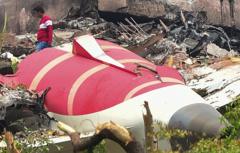India's Aircraft Accident Investigation Bureau (AAIB) has not yet finalized the decision on whether the flight data and cockpit voice recorders, commonly known as black boxes, from the Air India flight that crashed last Thursday will be sent for overseas analysis. The catastrophic incident occurred shortly after takeoff from Ahmedabad airport, resulting in at least 270 fatalities, primarily among passengers.
Despite various reports suggesting that the black boxes were being dispatched to other nations, the Ministry of Civil Aviation clarified that no definitive decisions have been reached. The AAIB plans to assess multiple factors, including technical, safety, and security considerations, before determining the location for the analysis.
The Enhanced Airborne Flight Recorders (EAFRs)—the flight data and audio recorders—were successfully recovered from the crash site. These units provide critical data on flight operations, including the status of gear and flaps, engine performance, and fuel flow. Such detailed information can help reconstruct the events leading to the accident and offer insights into the underlying causes.
Some reports have indicated that the recorders might have suffered significant damage due to post-crash fires, potentially complicating data extraction efforts in India. Renowned accident investigator Captain Kishore Chinta noted that one set of recorders might be sent to the U.S. to allow a comparison of data retrieved in India with that acquired by the National Transportation Safety Board (NTSB). The newly inaugurated AAIB lab in Delhi, which opened in April, is still under scrutiny regarding its operational capabilities for EAFR data downloads.
In a related development, N Chandrasekaran, chairman of Air India, revealed that one engine involved in the crash was newly installed, whereas the other was not scheduled for maintenance until December. He emphasized that both engines had a history of reliable service. In light of the accident, inspections have been completed on 26 of Air India's 33 Boeing 787-8 and 787-9 aircraft, with all units cleared for operational service.
India's aviation regulator mandated additional safety inspections for Air India's Boeing 787 fleet as a precautionary response to the crash. As a result, the airline announced a temporary reduction in flights on 16 international routes and the suspension of three overseas destinations between June 21 and July 15. The decision aims to facilitate enhanced pre-flight safety checks and manage flight durations amidst airspace closures in the Middle East. Furthermore, the airline stated that it would reduce wide-body flights by 15% temporarily.





















